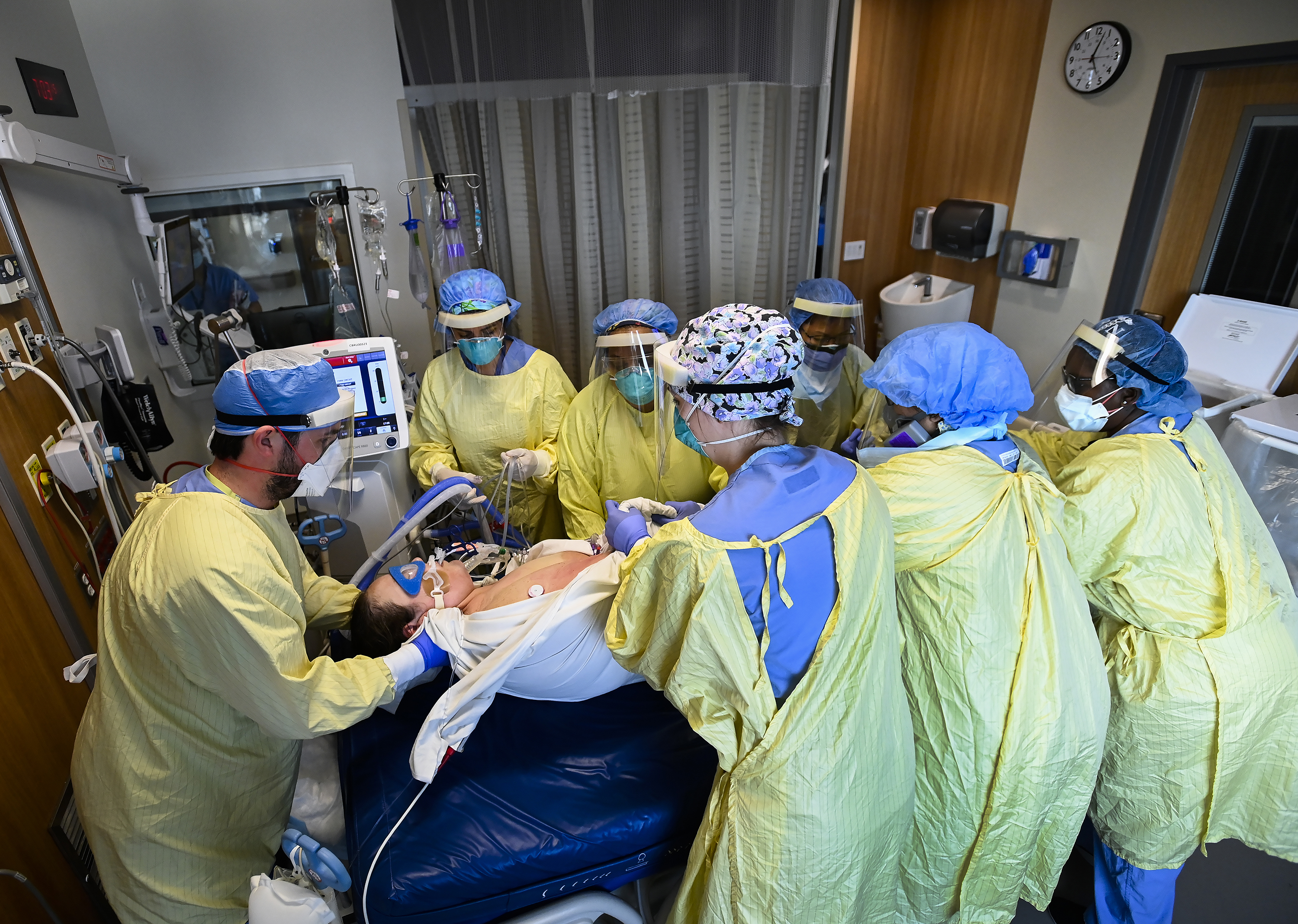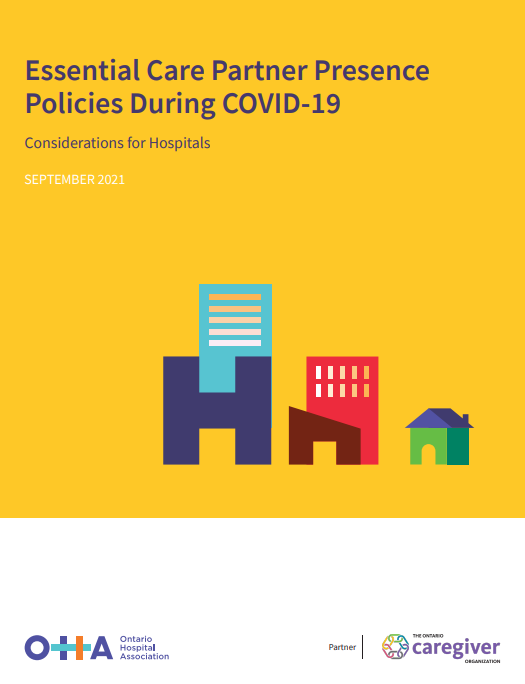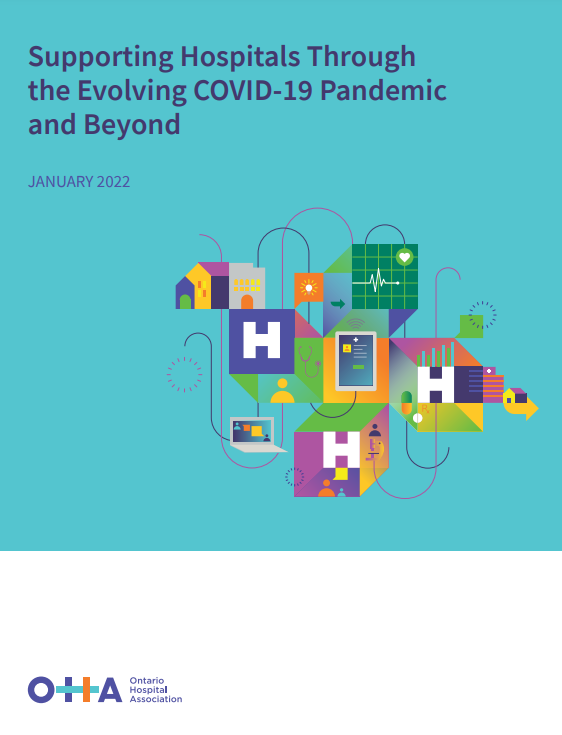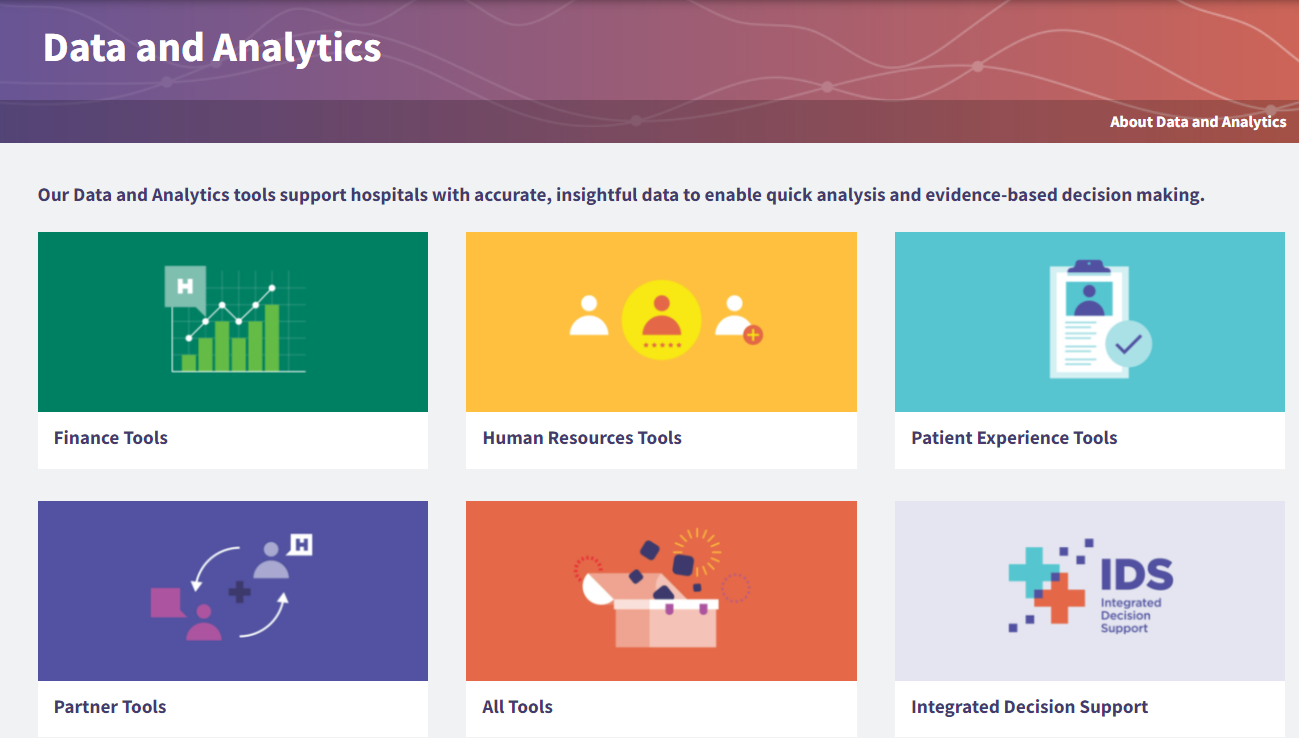The OHA developed educational videos reaching out to youth, featuring Ontario physicians, to answer questions about COVID-19 and combat misinformation.
An Ontario Hospital Association Member Update
Updated: February 2022
Since early 2020, Ontario's hospitals have continued to step up by serving as the anchor of the pandemic response. They have demonstrated remarkable resilience and commitment under, oftentimes, punishing conditions. Working side-by-side with government and system partners, hospitals faced extraordinary pressure from COVID-19 to provide lifesaving care to their own patients, while offering their support to long-term care homes, assessment centres and a successful vaccination effort, as well as conducting research to better understand the virus.
 The Ontario Hospital Association (OHA) is honoured to continue
supporting our hospital members as we navigate the pandemic and look to the
future. A strategic plan rooted in adaptability has enabled us to meet urgent
and emerging needs in a rapidly changing environment. This included providing
advice to government to address a range of financial, labour relations and
legal issues, as well as advocacy and public communications to encourage action
for the protection of all Ontarians.
The Ontario Hospital Association (OHA) is honoured to continue
supporting our hospital members as we navigate the pandemic and look to the
future. A strategic plan rooted in adaptability has enabled us to meet urgent
and emerging needs in a rapidly changing environment. This included providing
advice to government to address a range of financial, labour relations and
legal issues, as well as advocacy and public communications to encourage action
for the protection of all Ontarians.
Work is underway to shape the OHA of the future by incorporating lessons learned during the pandemic and through the development of our next strategic plan. The OHA is gradually shifting its focus from the pandemic response to important priorities that will help reinforce and revitalize Ontario's health system. Among them is ensuring the hospital sector regains stability through continued advocacy for investments and actions required for clinical and financial recovery. At the same time, we will remain vigilant to potential surges as the province gradually opens up and determines its approach to managing COVID-19 in the longer term. Until a new strategic plan is in place, the OHA will continue to deliver on key priorities under the current plan, which was extended to October 1, 2022, to coincide with the launch of a new plan.
The 2021 Report to Members has a dual focus, with an overview of both the OHA's efforts to support the sector's pandemic response and continued progress under the current strategic plan – all in service of our members and the healthcare system.
Part 1: Sustaining the Pandemic Response and Initial Steps towards Recovery
With the emergence of new COVID-19 variants which spiked hospitalizations and ICU admissions during successive waves, the OHA primarily focused on pandemic-related advocacy and providing member support on a range of financial, labour relations, legal and regulatory issues to protect hospital capacity.
Advocacy
The OHA was a leading voice calling for continued and strong public health measures, underscoring to government and the public COVID-19's threat to hospital capacity and access to care during the various waves.
During COVID-19’s third wave in spring 2021, the government supplemented
the previously established redeployment orders under the Emergency
Management and Civil Protection Act (EMCPA) with additional measures to
support the hospital sector's response, such as orders to facilitate the
implementation of new staffing models and preparing for possible redeployment
of healthcare workers between hospitals. Other orders
authorized Independent Health Facilities to redeploy staff to hospitals on
a voluntary basis, facilitated the flow of patients from acute to
long-term care and enabled temporary, emergency-based patient
transfers between hospitals. As the third wave slowly eased in May
2021, the OHA sent a letter to Premier
Doug Ford outlining important considerations to support a gradual,
evidence-based re-opening plan.
When the Omicron variant gained a foothold in Ontario, the OHA advocated for stronger public health measures to government to clearly signal to all Ontarians the seriousness of the situation, as well as the urgent need for people to get vaccinated and to strictly adhere to public health guidance. In January 2022, the government announced that it was instituting time-limited measures to preserve hospital capacity.
 The highly transmissible Omicron variant also introduced new challenges to hospital capacity due to staff shortages. To help the OHA's advocacy approach with government, we conducted a Health Human Resources (HHR) Workforce Survey to quantify the HHR and staffing concerns at hospitals. The results, representing 115 out of 140 hospitals (82%), were shared via a new data and analytics dashboard launched during a member webinar in early January. Following significant engagement with members and stakeholders, in February 2022, the OHA shared an HHR Policy Brief with the government, detailing an inventory of short- and medium-term practical solutions for improving Ontario's HHR.
The highly transmissible Omicron variant also introduced new challenges to hospital capacity due to staff shortages. To help the OHA's advocacy approach with government, we conducted a Health Human Resources (HHR) Workforce Survey to quantify the HHR and staffing concerns at hospitals. The results, representing 115 out of 140 hospitals (82%), were shared via a new data and analytics dashboard launched during a member webinar in early January. Following significant engagement with members and stakeholders, in February 2022, the OHA shared an HHR Policy Brief with the government, detailing an inventory of short- and medium-term practical solutions for improving Ontario's HHR.
Throughout 2021 and in early 2022, the OHA co-sponsored webinars with Ontario Health (OH) to connect hospital CEOs with OH leaders on emerging priorities related to the COVID-19 response, such as the critical HHR challenges during the fifth wave. Most recently, a member call was held to walk hospitals through the gradual resumption of non-essential, non-urgent hospital surgeries and procedures as pressures from the fifth wave gradually eased.
In November 2021, the OHA Board of Directors also welcomed Dr. Catherine Zahn, Deputy Minister of Health, to a meeting where she offered her perspective on actions needed as Ontario learns to live with COVID-19 as well as valuable lessons learned. She shared her priorities which align with the major challenges facing the health care system, including capacity, HHR, and integration.
Vaccines
 COVID-19 vaccines are critical to easing hospital capacity pressures in
the long-term. As such, the OHA proactively engaged the COVID-19 Vaccine
Distribution Taskforce early on outlining considerations to guide the
provincial vaccine rollout like addressing vaccine hesitancy and the need for a
broad and comprehensive communications strategy to maximize voluntary
vaccination of health care workers. Outreach to relevant system partners such
as the COVID-19 Vaccination Action Council also helped support the vaccine
effort.
COVID-19 vaccines are critical to easing hospital capacity pressures in
the long-term. As such, the OHA proactively engaged the COVID-19 Vaccine
Distribution Taskforce early on outlining considerations to guide the
provincial vaccine rollout like addressing vaccine hesitancy and the need for a
broad and comprehensive communications strategy to maximize voluntary
vaccination of health care workers. Outreach to relevant system partners such
as the COVID-19 Vaccination Action Council also helped support the vaccine
effort.
Together with the Healthcare Reciprocal of Canada (HIROC), the OHA hosted regularly held risk forums to address legal considerations on various vaccine-related issues covering topics such as legal impediments related to vaccine administration, including the need for a consistent consent process, detailed user agreements, and future use of data for research purposes.
In summer 2021, the OHA established the Healthcare Worker Vaccination Advisory Group (Advisory Group) with the goal of establishing a consistent, province-wide healthcare worker vaccination framework and to help the sector increase worker vaccination. On August 17, Ontario's Chief Medical Officer of Health issued Directive #6 which set out minimum requirements for hospital policies regarding COVID-19 vaccination among healthcare workers, enabling hospitals to tailor vaccine policies to their unique needs. The OHA developed a resource page (login required) to support hospital members with its implementation, including links to member supports.
The Advisory Group was reconvened following the government's announcement of mandatory COVID-19 vaccination in long-term care homes on October 1 to review potential next steps for the hospital sector. At the time, the OHA released a media statement applauding the government for its decision and calling for a consistent approach across the healthcare system. Despite the OHA's continued advocacy, Premier Ford ultimately announced the government's decision not to implement a province-wide vaccine mandate for hospital workers. In response, the OHA released a statement to express disappointment in the decision, and in November, OHA President and CEO Anthony Dale participated in several national broadcast interviews to continue to advocate for a province-wide directive on healthcare worker vaccination.
In the absence of a government directive, individual hospitals across the province demonstrated leadership by implementing mandatory vaccination policies customized to their circumstances. Some of these policies were the subject of unprecedented injunction applications before the courts. The impacted hospitals led the response to successfully defend against these applications; given the provincial implications, the OHA joined this litigation process as an intervenor to help support these efforts.
Funding and sustainability
The pandemic has had a substantial impact on hospital operations and, in turn, hospital finances. To support members, the OHA has been closely monitoring the financial stability of hospitals with regular financial surveys to inform discussions with the Ministry of Health (MOH).
On July 8, 2021, the MOH released the COVID-19 expense reimbursement process for the 2021/22 fiscal year, confirming its extension. However, the MOH also introduced more limited eligibility criteria for the 2021/22 fiscal year, retroactive to April 2021, despite hospitals' continued support of the province's pandemic response. In response to concerns raised by the OHA on behalf of members, on July 26, the MOH reversed its decision and confirmed that they would be reimbursing the hospital sector for the expenses reported for fiscal year 2021/22. To date, the MOH has reimbursed hospitals for COVID-19 incremental expenditures for the remainder of fiscal year 2021/22. We continue to be in regular communication with senior MOH staff to ensure timely reimbursement of incremental expenses and lost non-ministry revenue.
The OHA continues to collaborate with Ontario Health and the MOH to ensure that hospitals are financially stable during the pandemic. Over December 2021 and January 2022, working capital and lost-revenue funds were distributed to hospitals and the reconciliation process is expected to be completed next quarter. The OHA has also facilitated a number of webinars on behalf of the MOH to support members with these ongoing investments and changes to eligibility criteria and reporting requirements.
Communications, member and stakeholder engagement

An aggressive, multipronged communications strategy supported OHA advocacy efforts to safeguard the province's finite health system capacity. It consisted of media interviews at the regional, provincial and national levels which resulted in coverage in almost every notable outlet in the province, an updated social media campaign, and outreach to youth via informational videos, which won Best Overall Campaign at the Reed Awards beating out international competitors.
The OHA also began to publicly share detailed hospital capacity data on a regular basis during the Omicron wave to increase awareness about the impact of COVID-19 on hospitalizations and ICU occupancy.
Research and analysis
A dedicated research and analysis unit also helped support the OHA's communications, policy and advocacy work with research and evidence on a wide range of COVID-19 issues, including a bi-weekly review of select local and international COVID-19 initiatives, and the development of a vaccine resource page and research brief designed to assist hospitals in building vaccine confidence. Another research brief highlighting the elements and principles of effective communication strategies was developed for members, offering guidance that would help increase the impact and reach of their efforts (e.g., choosing appropriate language to promote adherence to public health advice).
 Partnerships
Partnerships
To help hospitals ensure that flexible policies are in place to enable
essential care partner presence for hospital patients during the pandemic, the
OHA in partnership with the Ontario Caregiver Organization (OCO), revised the Essential Care
Partner Presence Policies During COVID-19 Considerations for Hospitals
guidance document. Informed by Ontario patients and caregivers, updates were
made to reflect the changing pandemic landscape. Together, the two
organizations also held a virtual conversation to further the conversation
around policy development and implementation and discuss important
considerations for hospitals and care partners moving forward.
Strategic plan and post-pandemic priorities
In early 2021, the OHA held a series of member engagement sessions to gather feedback on the pandemic's impact on hospitals and for input on key learnings for the healthcare system. They were also an opportunity to report on progress towards the development of the OHA's next strategic plan, which will be implemented in October 2022. A Special Committee of the OHA's Board of Directors guides this work, and engagement with members, partners and stakeholders continues.
The OHA also convened an internal OHA team to focus on post-COVID recovery and transformation. Partly informed by the member consultations, this project has two components: a retrospective compilation of hospital experiences and lessons learned, and prospective work to inform future advocacy and thought leadership. Our goal is to align and collaborate with partners wherever possible, while being a strong voice for hospitals.
Ahead of the general election in June 2022, we are ensuring a number of key post-pandemic policy priorities are ready for consideration by the newly elected government. These include addressing health human resources challenges, improving access to care for vulnerable populations, and accelerating system integration.
Part 2: Laying the Groundwork for Future Recovery
Advocacy
 The Advisory Group on Pre-budget Advocacy and Election Preparedness,
convened in summer 2021, provides advice and guidance to the OHA on the
pandemic's long-term financial impact on the hospital sector and will help
determine the key components of the OHA's policy platform. The Advisory Group has
helped inform advocacy efforts for the 2021 federal election
and the 2022 provincial Budget, and will also be providing advice on the 2022
provincial election.
The Advisory Group on Pre-budget Advocacy and Election Preparedness,
convened in summer 2021, provides advice and guidance to the OHA on the
pandemic's long-term financial impact on the hospital sector and will help
determine the key components of the OHA's policy platform. The Advisory Group has
helped inform advocacy efforts for the 2021 federal election
and the 2022 provincial Budget, and will also be providing advice on the 2022
provincial election.
Recently, the OHA shared its pre-budget submission with the Government of Ontario to address the immediate capacity challenges facing hospitals and to ensure that the foundational financial needs of hospitals are met for the duration of this fiscal year and in 2022/23. The OHA plans to meet with the Minister of Finance, President of the Treasury Board, Deputy Premier/Minister of Health, and senior leadership within the Ministry of Health to share its recommendations.
The Ontario government already committed to keeping hospitals financially whole throughout the pandemic and the OHA will be looking to ensure continued stability for the remainder of this fiscal year and next.
In an addendum to its pre-budget submission, the OHA recommends funding and government policy support to enable the hiring of more registered nurses, registered practical nurses as well as other critical healthcare workers over the next five years. Hospital members have emphasized the need to take a multi-faceted approach to the health human resources (HHR) challenges facing the healthcare system, and as such, the OHA continues to advocate for a comprehensive HHR strategy from the Government of Ontario. As previously noted, the OHA developed a substantive policy brief to assist with these efforts and support continued engagement with the Ministry of Health and Ontario Health including during the pre-election period.
This builds on earlier efforts to highlight the province's HHR challenges. In May 2021, the OHA, together with the Ontario Long Term Care Association, Colleges Ontario and the Council of Ontario Universities, issued a joint letter to government calling for a comprehensive HHR strategy to ensure Ontarians have access to the right number and mix of qualified healthcare providers now and in the longer term. Among other things, it requests immediate action to strengthen the HHR workforce in various areas; expanded enrolment in health and supportive care programs; and the establishment of an interprofessional HHR planning table to analyze health workforce data and develop an HHR strategy.
Supporting long-term care reform: In March 2021, OHA staff presented before Ontario's Long-Term Care COVID-19 Commission for the second time, joined by the OHA's Board Chair and hospital CEOs. Building on a previous presentation in October, the OHA provided an overview of key events and member reflections on Wave 2 of the pandemic and offered high-level considerations for creating a more robust and resilient long-term care (LTC) sector. The OHA also made a written submission building on these themes in more detail.
In November, the OHA made a written submission to the Standing Committee on the Legislative Assembly in respect of Bill 37, the Providing More Care, Protecting Seniors, and Building More Beds Act, 2021. The OHA supported legislative changes in areas such as infection prevention and control and quality improvement as a promising start, but also suggests that more transformative action is required to protect Ontario's LTC residents and give them the quality of care they deserve.
Education and research mandates: As part of our post-pandemic advocacy, we look forward to advancing the new education and research mandates which were informed by extensive consultation with members. These efforts will be guided by the following vision statements:
Education: "Collaborate inside and outside hospital walls to educate and train the health professionals that Ontario needs to deliver exceptional patient care and build a high-performing health care system."
Health research: "A fully integrated health research and care delivery system across Ontario that drives sustainable and transformational science, clinical excellence, health equity and an agile, diverse workforce of scientists and innovators."
Strengthening the hospital-physician relationship
 Over the past year, the OHA continued its work to enhance the relationships between hospitals and physicians, which included a focus on strengthening its partnership with the Institute of Health Policy Management and Evaluation (IHPME), Dalla Lana School of Public Health (DLSPH) at the University of Toronto. In addition to the publication of five peer-reviewed manuscripts, the OHA/IHPME research team developed a cross-sectional survey and acquired baseline data on current Ontario rates of hospital physician engagement at the individual, organizational and system levels.
Over the past year, the OHA continued its work to enhance the relationships between hospitals and physicians, which included a focus on strengthening its partnership with the Institute of Health Policy Management and Evaluation (IHPME), Dalla Lana School of Public Health (DLSPH) at the University of Toronto. In addition to the publication of five peer-reviewed manuscripts, the OHA/IHPME research team developed a cross-sectional survey and acquired baseline data on current Ontario rates of hospital physician engagement at the individual, organizational and system levels.
In September 2021, the OHA, in consultation with the Ontario Medical Association (OMA), substantially revised and relaunched the Professional Staff Credentialing Toolkit. Published almost a decade ago, the Credentialing Toolkit was revised to reflect current practices in hospitals, capture general policy and legal and environmental changes since it's original release. The OHA and OMA also jointly published an update to the Prototype Board-Appointed Professional By-Law to reflect legal and regulatory changes, evolution in hospital practice, and lessons learned from the COVID-19 pandemic.
Transitioning under the ONCA
When the Ontario Not-for-Profit Corporations Act, 2010 (ONCA) came into force on October 19, 2021, the OHA worked to substantially revise its Hospital Prototype Corporate By-law, and developed a comprehensive guide to assist members in transitioning to ONCA over the next three years. In conjunction with Borden Ladner Gervais, the OHA has developed additional resources to support hospital members, including updated template governance forms and educational webinars.
Youth DiverSTEAM Symposium: Promoting careers in hospital research
 On May 13, almost 300 high school students in Grades 9-12 had the opportunity to hear about the various pathways to a career in hospital-based STEAM research and to network with 200 hospital-based researchers in a virtual environment. Hosted by the OHA and Let's Talk Science, the event was championed by the OHA's Health Research & Innovation Committee, which established an Anti-Racism Task Force in 2020 to identify, challenge and change the values, structures and behaviours in place that perpetuate the differential treatment of individuals based on ethnic identity.
On May 13, almost 300 high school students in Grades 9-12 had the opportunity to hear about the various pathways to a career in hospital-based STEAM research and to network with 200 hospital-based researchers in a virtual environment. Hosted by the OHA and Let's Talk Science, the event was championed by the OHA's Health Research & Innovation Committee, which established an Anti-Racism Task Force in 2020 to identify, challenge and change the values, structures and behaviours in place that perpetuate the differential treatment of individuals based on ethnic identity.
Data and Analytics
In January 2022, the OHA unveiled a newly designed Data and Analytics (D&A) platform developed to enhance the user experience, showcase new tools, and keep pace with the rapid growth of the OHA's data and analytics offerings as it evolves to meet members' changing needs.

In fall 2021, the OHA launched a Financial Year-End Dashboard to provide an easily accessible snapshot of a hospital's financial performance that helps hospitals understand how they compare with peers. Using four key indicators, hospital leaders can review at high-level, their organization's financial position and operating activities at the end of each fiscal year.
The OHA is also taking steps to enhance hospitals' access to effective patient experience measurement tools. In January 2021, the OHA launched broad, in-depth consultations with hospital members to inform a competitive request for proposals (RFP) for a new patient experience measurement provider. The RFP was released in July 2021 and a new contract agreement is expected to be in place for the 2022-23 fiscal year.
As a leading collaborative solution for sharing integrated health partner data, Integrated Decision Support (IDS) has helped enrich and grow the OHA's data and analytics portfolio. Since the OHA assumed stewardship of IDS in early 2021, there has been strong and steady interest and expansion with new signed clients, including multi-sector partners from Ontario Health Teams and hospitals. Work is currently underway to establish the IDS Governance Committee and IDS Privacy Committee.
Labour and Benefits
Benefits strategy: Over the past two years, the OHA and HIROC Management Limited (HML) have engaged in significant preliminary work to determine the viability, approach, and considerations for a universal provincial benefits strategy to be co-designed by hospitals, for hospitals. In fall 2021, a major milestone for this initiative was announced. Both the OHA and HML boards approved the recommendation to continue the organizations' joint efforts towards developing a province-wide healthcare employee benefits program. Feedback from a series of member engagement sessions reaffirmed the level of member support for the strategic value of this work to the sector and also informed this decision. The OHA is now working with HML and will be engaging directly with hospitals to further design the details of the provincial plan.
Collective bargaining: For the second consecutive year, the OHA Labour Relations team was heavily engaged in negotiating a renewed collective agreement with the Ontario Nurses' Association (ONA) – the largest central bargaining process involving almost all Ontario hospitals. As was the case in 2020, the negotiations proved to be complex given the impact of Bill 124, Protecting a Sustainable Public Sector for Future Generations Act, 2019, as well as the ongoing response to the COVID-19 pandemic. These external forces ultimately resulted in the parties reaching an impasse in negotiations, with outstanding issues referred to interest arbitration in April, with a decision issued in September.
Additionally, the OHA team commenced negotiations with the Canadian Union of Public Employees (CUPE) and Service Employees' International Union (SEIU) for a renewed collective agreement at a joint table. As with ONA, these negotiations take place under the auspices of Bill 124. The parties were unable to negotiate an agreement in late September, and are scheduled for interest arbitration dates in early June 2022.
Funding
Hospital Advisory Committee: The Hospital Advisory Committee (HAC), a collaboration between the OHA, the Ministry of Health (MOH) and Ontario Health (OH), has been meeting monthly since September 2021 to provide strategic advice and recommendations to the MOH on patient-based funding models, their implementation, and improvements to health funding practices. The OHA played an instrumental role in the reconvening the HAC, which has enabled the OHA to advocate for and support the development of funding approaches that are equitable and create financial stability.
Through the HAC structure, the OHA reconvened the Financial and Clinical Data Advisory Committee to provide recommendations and advice on improving timely access to financial and clinical health data needed to support health system models of care. The Formula and Tools Task Group also reconvened in November 2021, which is mandated to provide advice and recommendations on the technicalities of the current funding formula.
The OHA has also taken a leadership role on a number of important initiatives, including:
- Developing funding approaches to support quality improvement for inpatient schizophrenia care and kidney transplants.
- Working closely with the MOH and OH, the OHA hosted various webinars to ensure hospital administrators had the opportunity to understand the funding methods in place, especially during the pandemic.
- The OHA will continue to advocate for financial stability and the need for a capacity plan to address the alternate-level-of-care (ALC) issues and surgical backlogs facing the system.
- The HAC secretariat, with support from the OHA, MOH, and OH teams, will be working on developing strategies for the "new normal" costs for hospitals with a focus on financial stability and predictability. Recommendations to address ALC challenges and the need for capacity planning were also identified as priority areas for the HAC Secretariat.
The Mental Health and Addictions (MHA) Funding Initiative: The Mental Health and Addictions Funding Initiative, coordinated by the OHA on behalf of the HAC, has made significant progress toward funding approaches that support and incentivize improved quality of care for Ontarians. With an initial focus on inpatient activity related to people living with schizophrenia, a short-term approach has been recommended to link its hospital-based quality standard to funding.
Primary data collection took place over summer 2021, and the MOH, OH and the OHA worked with the Canadian Institute for Health Information (CIHI) to enable more convenient prospective collection of the necessary data under the Ontario Mental Health Reporting System going forward. The existing primary data has been put to good use. In December 2021, the OHA launched a new Mental Health and Addictions Quality Standard – Schizophrenia Care Dashboard. Accessible via the OHA's Data and Analytics platform, the dashboard allows hospitals to compare their performance with peers and can be used for performance measurement and quality improvement purposes.
As part of the Initiative, the OHA and OH's Mental Health and Addictions Centre of Excellence also designed a series of free virtual education sessions on measurement-based care (MBC) in mental health and addictions service delivery for Ontario. Each webinar featured local and international leaders who have implemented and scaled MBC in their care settings. The considerable number of participants from senior administrative and clinical leaders in addition to patient care providers, demonstrated a growing appetite to learn how local peers have tackled the challenges of implementing MBC.
Exploring integrated care funding concepts and principles: To better understand funding concepts and principles that support integrated care, the OHA initiated a literature review and discussions with local and international policy makers, academics and hospital executives. The OHA's Research and Analysis Unit continues to undertake this research in collaboration with academics at the Laval University, with the goal of a virtual round table discussion on the findings in spring 2022.
Exploring emergent issues impacting hospitals
The research and analysis unit continues to inform the OHA's policy, advocacy and communications work by exploring emergent issues impacting hospitals from a healthcare perspective and beyond. This has included the curation of anti-racism and population health resources which will be vital to system revitalization in the aftermath of the pandemic given the significant health care gaps further exposed during this period.
Organizational/Partner updates
The OHA is committed to exercising its duties and obligations to ensure effective stewardship of Healthcare of Ontario Pension Plan (HOOPP). Together with the other Settlors of the Plan, the OHA remains focused on the pension accounting treatment of HOOPP and its impact on HOOPP's independence and ability to deliver on its pension promise. The OHA has also worked with the HOOPP Board to fulfil recruitment needs and establish a new pension observer strategy.
In January 2022, the OHA introduced the Proximity Institute, an independent charitable organization founded by the association that is dedicated to enabling effective leadership at the most senior level in Ontario hospitals. Working in partnership with CEOs and their leadership teams, Proximity seeks to understand the contextual realities facing Ontario hospitals in order to drive action on the priorities that matter most. Its long-term ambition is to measurably close the leadership gap facing Ontario's hospitals by working collaboratively to identify, develop and ready a quality pipeline of emerging CEO talent.